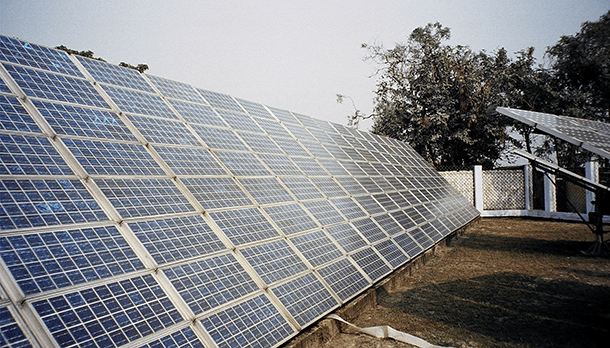A US trade complaint may hinder India’s plan for a homegrown solar industry
A solar charging station in the Narsindi district of India. Currently, much of India relies on coal for power, but it has committed to expanding its use of solar energy as part of the Paris Climate Agreement.
In a surprising ruling that runs counter to the agreements made at the Paris Climate Summit, the World Trade Organization has said that India may not protect local production of solar energy cells.
The ruling came in response to a complaint from the United States, which claimed that India’s requirement that 10 percent of its solar panels be produced domestically amounts to restraint of trade.
The WTO case raises serious doubts about the Obama Administration’s commitment, under the Paris Climate Agreement, to help developing countries use climate-safe energy to stimulate local jobs and economic development, according to some observers.
It also appears to contradict promises made by the president in January 2015 in New Delhi when he visited Indian Prime Minister Narendra Modi.
“The ink is barely dry on the Paris climate accord and yet we're seeing in this action that trade trumps climate,” says Sam Cossar-Gilbert of Friends of the Earth. “A number of developing countries see local green jobs as a key way to stimulate the economy, and this ruling really goes against that.”
India plans to install 100 gigawatts of solar power in the next six years as part of its commitment to the Paris Climate Summit, where Prime Minister Modi launched what’s called the International Solar Alliance. The alliance would mobilize a trillion dollars by 2030 to harness the sun’s power for the developing world and help build new clean energy economies.
But now this ruling against India by the World Trade Organization casts a shadow over the country’s hopes for a homegrown solar economy. India has not said whether it will appeal the ruling.
“It's quite ironic,” Cossar-Gilbert says, “because the United States and a number of states within the US also use a similar ‘buy local’ clause in their solar programs.”
Asked for comment, US trade representative spokesman Andrew Bates responded with a statement that says, in part:
“The single, specific policy that the United States challenged at the WTO, which comprised one small portion of the National Solar Mission of India, discriminated against American solar exports and required the use of more expensive and less efficient solar equipment, thereby raising the cost of generating clean energy across India."
“Governments should be free to use common sense climate policy in the way that they see fit,” Cossar-Gilbert argues. “If India or other developing countries cannot enact policy to support the creation of domestic industries, it's much less likely that these policies will see the light of day.”
“Supporting infant industries, like the Indian solar industry, is a well-known economic development model,” Cossar-Gilbert says. “India is only using a small percentage of the program as domestic content — around 10 percent — and India continues to import about 100 million solar panels. So that argument is, I think, self-interested, and in the case of India, it is real hypocrisy from the US government, which uses similar policies to support their industry.”
This article is based on an interview that aired on PRI's Living on Earth with Steve Curwood
